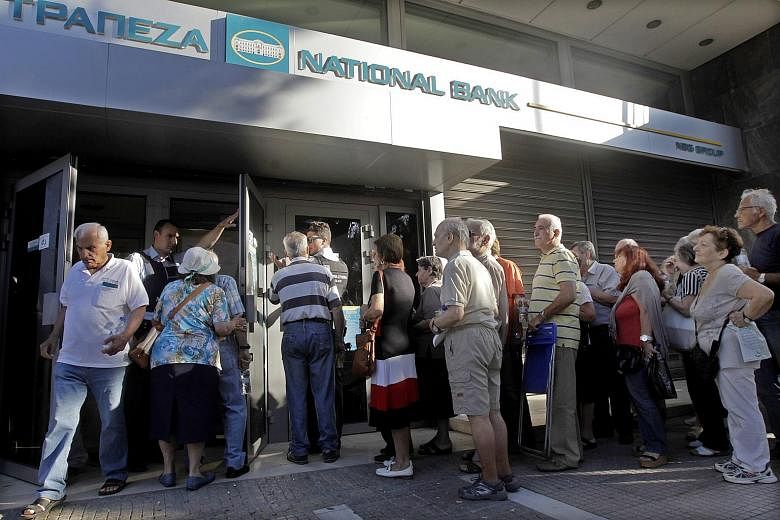SOCIETY
The cost in human terms already has been huge. Gross domestic product (GDP) is down by more than 25 per cent, wages cut by 35 per cent, pensions by 20 to 60 per cent.
Since the start of this year, 59 Greek companies have been shuttered each day, costing 613 jobs and €22 million (S$33 million) in GDP every 24 hours, according to industry groups. More than 90 per cent of Greece's roughly 750,000 businesses are small and medium-sized enterprises.
Essential services, including healthcare, continue to feel the strain. Fears have grown of a shortage of petrol and medicine if a cash squeeze continues, and for supplies of basic foodstuffs.
Latest figures put Greek unemployment at 26.1 per cent, or 1.25 million people, and chances of never finding work are increasing for many. Eurostat figures show 73.5 per cent of people who were unemployed in Greece last year had been out of work for more than a year, compared with 67.1 per cent in 2013.
Youth unemployment stood at 49.7 per cent in March.
BANKS
Banks which have been closed for the past week are estimated to have less than €1 billion (S$1.5 billion) in liquidity, which is not enough to meet depositors' demands for cash. They are expected to stay shut at least until today. Greeks also will not be able to withdraw cash from safety deposit boxes.
Meanwhile, pensioners face the uncertainty of whether they can cash in their retirement benefits. The Greek government's monthly salary and pensions bill is between €1.4 billion and €1.7 billion.
DEBT
Greece has a €3.5 billion (S$5.2 billion) debt payment due to the European Central Bank (ECB) on July 20. Even if the banking system limps along until July 20, missing a payment to the ECB could trigger a financial crisis.
The potential failure of the banking system is the most likely trigger for an exit from the euro, say economists. Without central-bank financing in euros, Greece would have to print its own currency to keep its banks alive - an outcome Greeks and Europeans fear would unleash new chaos.
EURO ZONE
Leaving the euro zone would make some matters worse. For example, some Greeks owe debts denominated in euros to overseas creditors. If Greece forcibly converts euros in domestic banks into drachmas, those drachmas are likely to plunge in value, making it harder for Greeks to pay off foreign debts with depreciated money.

